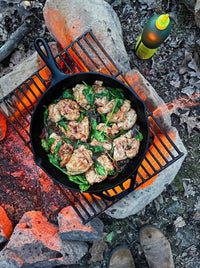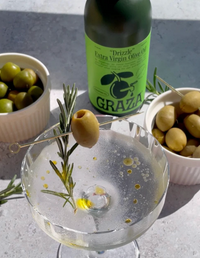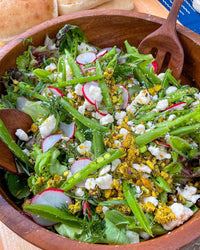
Olive Oil vs Safflower Oil: Your Questions Answered
When it comes to choosing cooking oils, the options seem endless. And let's face it, the oil aisle at the grocery store can have more options than an all you can eat buffet (oil you can eat.. get it?!). Today, we're exploring the nuances of olive oil vs. safflower oil. Which one should you choose? Spoiler alert: it depends. But stick around, and we'll break it down so you can make the best choice for your kitchen.
Origins: Groves vs. Fields
Olive Oil: Straight from the sun-kissed groves, olive oil is pressed from olives. It's a staple of the Mediterranean diet and has been prized for centuries. Bonus trivia: ancient Greeks also used it as a skincare elixir.
Safflower Oil: Derived from the seeds of the safflower plant, this oil hails from vibrant fields of yellow blooms.
Flavor: Bold vs. Neutral
Olive Oil: Fruity, earthy, and something a little peppery. Olive oil can bring a lot of personality to the table. Try a cooking oil like Sizzle when you want a mellower flavor and a finishing oil like Drizzle when you want that fantastic peppery finish!
Safflower Oil: With its neutral profile, safflower oil stays out of the spotlight. It's ideal when you're aiming for subtlety.
Health Benefits: Antioxidants vs Cholesterol Control
Olive Oil: EVOO is packed with monounsaturated fats and antioxidants, making it a darling of the heart-health world. Studies have linked it to reduced inflammation and lower risks of heart disease.
Safflower Oil: High in polyunsaturated fats, safflower oil can help reduce bad cholesterol. Some varieties are also rich in oleic acid, which shares heart-healthy benefits with olive oil.
Cooking Performance: High Heat vs Higher Heat
Olive Oil: Best for everyday cooking temps, EVOO's smoke point is around 420F. It's perfect for baking, sautéing, roasting, searing, and light-frying.
Safflower Oil: The smoke point of safflower oil is about 450F, making it a go-to for high-heat frying, wok cooking, and other high-temperature techniques.
Sustainability: Hardy Trees vs Water Needs
Olive Oil: Olive trees are tough, long-lived, and thrive in harsh conditions. Making them a relatively sustainable crop.
Safflower Oil: Safflower plants often require more water and resources, which gives them a slightly larger environmental footprint.
The Verdict: Which Should You Choose?
It depends on your kitchen goals:
For neutral flavor and higher heat versatility, safflower oil is your best best.
For flavor, health benefits, and everyday cooking temps, olive oil the clear winner. EVOO stands out for its unmatched flavor and heart-healthy antioxidants, making it a must-have for any kitchen. With its versatility and Mediterranean magic, it's the oil you'll keep reaching for again and again. Happy squeezing!

















